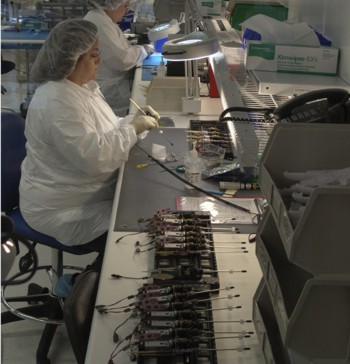Sanarus Introduces New Tool for Breast Tumor Biopsy
Sanarus Introduces New Tool for Breast Tumor Biopsy

New CASSI Handheld Biopsy Device is Cordless and Fully Disposable
Sanarus Medical has begun marketing a self-contained, single-use breast tumor biopsy device called CASSI that is designed to reduce the cost of procedures while making them less traumatic for patients. Sanarus, located at 5880 West Las Positas Boulevard, is dedicated to providing solutions for the screening, diagnoses, and follow-up treatment of breast disease.
"The trend in breast surgery is to get away from open surgical procedures that are done in an operating room and move towards minimally invasive technology that can be used in the physician's office," says Russ DeLonzor, vice president of research and development at Sanarus. "It saves the insurers a lot of money, the doctors like it better, and it's especially good for the patient. We're helping to drive the trend toward these procedures by developing products based on our patented cryoablation technology." Cryoablation involves using a probe to freeze tumors and some surrounding tissue to enclose them within a ball of ice.
"Right now, there are basically two minimally invasive methods of doing breast tumor biopsies," DeLonzor says. "The first is to try to 'harpoon' the tumor with a spring-loaded probe to grab a tissue sample. However, it sometimes takes 10 or 11 tries to actually get enough tissue to do a diagnosis. For some women, this can be the worst part of the medical experience after actually finding a lump. The other current method uses a device called the Mammotome, which gives pathologists better samples to work with," DeLonzor says. Johnson & Johnson's Mammotome system uses x-ray or ultrasound guidance to insert a probe within the abnormal area of the breast.
Once in position, a vacuum system draws tissue into a sample chamber, then a rotating device cuts a small tissue sample and sends it to a collection area. "The down side is that these rotational core devices are very expensive," DeLonzor says.
Sanaurus' new CASSI device, which will be launched this summer, is intended to achieve the high quality sampling of rotational core devices in a form that's completely disposable. "The biggest challenge is to immobilize the lesion," DeLonzor says. "Our claim to fame is cryoablation, so we decided that it might be appropriate for holding a tumor in place. We found that we could use a small CO2 canister to give us a cryo effect. In the doctor's office, under ultrasound guidance, the physician inserts the needle into the lesion, which is immobilized by a "quick stick freeze," which makes use of the fact that a wet object will stick to an extremely cold object. Once it's immobilized, CASSI uses that same CO2 canister to drive a rotational cutting instrument over the needle to provide a large reliable tissue sample for diagnosis. It's a lot easier on the doctor and the patient."
The monetary benefits of CASSI also make it extremely attractive to doctors, patients, and insurers. A vacuum-based device requires a capital expenditure of tens of thousands of dollars for equipment along with the cost of the disposables for each procedure. The entire one-time-use CASSI will cost about the same as the disposable used in that type of procedure without requiring any capital expenditure.
It is estimated that half of all women in the U.S. will seek consultation for a breast disorder in their lifetime. Approximately 80 percent of these women are diagnosed with benign breast disease, defined as any non-cancerous breast abnormality. Undoubtedly, these women will view a device that can reduce the anxiety and pain that accompanies the diagnosis of such disorders as a breakthrough.
Photo: Technicians assemble CASSI in the Sanarus clean room.
Also in this issue...
- Sanarus Introduces New Tool for Breast Tumor Biopsy
- AMS Electric Rides the Current Into Hacienda
- Business Bits
- Executive Profile: Neal Smither, Central Building LLC and Access for Disabled Americans
- Marzel's Offers a Perfect Fit for Breast Cancer Survivors
- American Express Financial Advisors is Right on the Money
- Whether a Short or Extended Stay, Business or Pleasure, Hacienda's Hotels have Everything to Make Visitors Feel at Home
- Oakland Arena Offers Discounted VIP Club Memberships to Hacienda Tenants, Residents
- Pleasanton Chamber's New "Vision Pleasanton" Program Provides Business Community with a Political Voice
- IAAP Offers Resources to Administrative Professionals
- WHEELS Pass Renewal
- Hacienda Index
- Calendar




